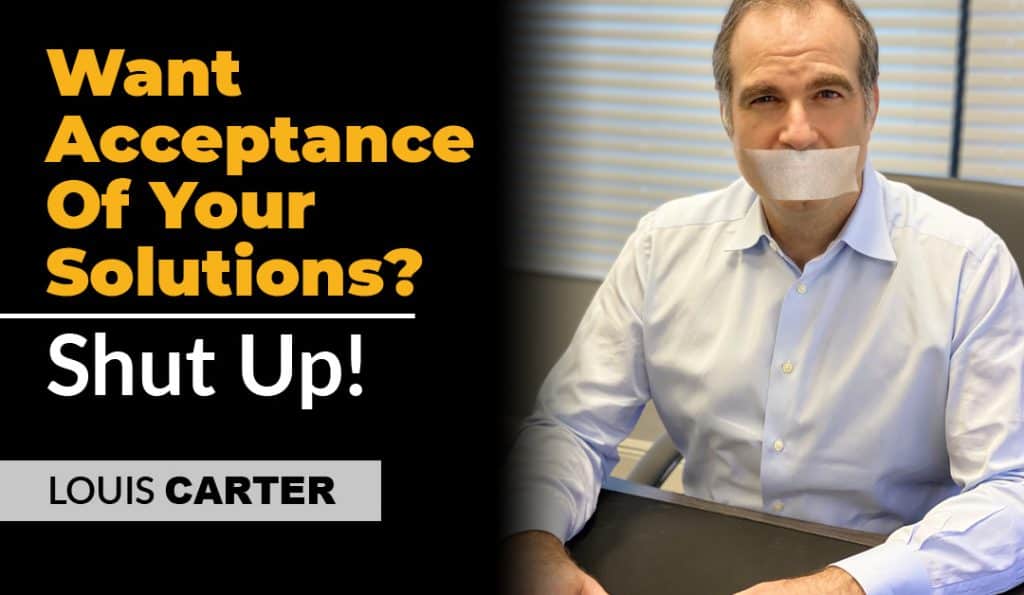
The Five Insights Nobody Knows About Best Places To Work For
Employees are the most valuable asset possessed by a business. It is easy for a company’s most valuable asset to lose motivation when they only

Employees are the most valuable asset possessed by a business. It is easy for a company’s most valuable asset to lose motivation when they only

When it comes to involving others to co-creating, get in the mindset of putting others first. Focus on the design of the communication to get

Leaders in the workplace often struggle with gaining acceptance for ideas or solutions to problems. It does not matter if your ideas are brilliant if

Have you ever been in a team in which someone took charge by communicating a compelling understanding of the purpose of the project, a marked

What is facilitative leadership? Is it an underrated way to lead? It could be because facilitation and balancing various viewpoints is often seen as a

I have seen many intelligent and hardworking leaders with good intentions become lazy. Such leaders do not shy away from performing their duties but they

Directive leadership is one of the more common leadership styles, where the leader instructs his followers precisely what to do and how to do it.

As a leader, how often do you find yourself being the smartest person in the room? Is it sometimes, most of the time, or is

While conventional forms of leadership are all about control, servant leadership places the needs of other people first and looks to transfer some of the

In recent times, within business circles, the “participative leadership” concept has become a catch-phrase. If you follow company blogs about leadership, then you have most
Organizational change often fails, not because of poor ideas, but because of emotional resistance and misalignment. At Louis Carter, we help you tackle the human side of change head-on. From silos to fear of the unknown, we identify what truly holds your team back and replace resistance with purpose. Our proven methodology empowers leaders to create emotionally connected, high-performing workplaces where change isn’t feared, it’s embraced.


What is a Leader? A leader is an individual who directs a group, company, country, or state of affairs. A strong business leader sets goals and facilitates people to collaborate and feel excited to achieve

Co-creation allows you to include many different people in your innovation process and the development of new practices. When you tell someone what to do, you will win or lose; your success becomes infinite if

You do not always have to achieve consensus. There are times when attempting to agree on some issues might even be counterproductive. It can result in expensive delays or a leadership failure. However, establishing consensus

Almost every debate about organizational change begins with the obvious statement that “change is difficult.” And, on the surface: change as its name implies necessitates effort. The problem with this mindset, which permeates our workplaces

Companies that want to seize opportunities, grow unconstrained, and look long-term are hiring fast. Once you know you need to hire quickly, the following steps can ensure that you’re hiring process is efficient and productive.

Stanley Middleman is the founder and Chief Executive Officer of Freedom Mortgage Corporation, a national, full-service mortgage banker headquartered in Mount Laurel, NJ. The company is ranked in the top 10 mortgage originators nationally.

A good manager takes charge of their team. A great manager takes the lead. Recognizing what needs to change is the first step in transitioning from a good manager to a great one. Managers who

Work is a social construct. Since labor moved from the cottage, forest, and field, we have struggled to understand the relationship among work, workers, and workplaces. This dynamic drives a world feeling its way through

A transactional leader prefers to lead with order and structure. They are likely to be in charge of military operations, large enterprises, or global projects with rules and regulations for meeting deadlines or moving personnel

Throughout history, certain individuals have stood out not only for their achievements but also for the way they inspired people to believe in something greater. These are the leaders who left behind more than political